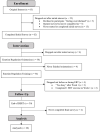Development and Feasibility of an Online Brief Emotion Regulation Training (BERT) Program for Emerging Adults
- PMID: 35757621
- PMCID: PMC9226550
- DOI: 10.3389/fpubh.2022.858370
Development and Feasibility of an Online Brief Emotion Regulation Training (BERT) Program for Emerging Adults
Abstract
Mental wellness is a critical component of healthy development in emerging adulthood and serves to protect against stress and promote resilience against psychopathology. Emotion regulation is a key mechanism for effective prevention because of its role in socio-emotional competence and its transdiagnostic significance for psychopathology. In this feasibility study, a brief, time and cost-effective emotion regulation training program for emerging adults (BERT) was developed and tested using the RE-AIM framework. Importantly, building interventions within the context of an implementation framework, such as the RE-AIM framework, enhances the chances that an intervention will be able to scale out and scale up. First, the brainwriting premortem method was utilized to refine program content, conducting focus groups a priori to identify potential program failures prior to program implementation. Undergraduate students (n = 12) attended four focus groups presenting initial program content. Four clinicians were also interviewed to determine program barriers. Qualitative analyses aggregated participant feedback to identify compliments, changes, and concerns about BERT and critical feedback was immediately implemented prior to initial testing. BERT was rooted in cognitive-behavioral practices and informed by the Gross model of emotion regulation. The 5-week program was then examined in a college sample (N = 42) to evaluate implementation (low attrition, high content engagement, favorable attitudes, low incidence of technical errors, costs), reach (enrollment and completion demographics comparable to the population in which recruitment took place), and efficacy (positive change in emotion regulation pre- to post-program). Of the recruited participants, 36 remained in the study where 27 completed at least 80% of program content. Repeated-measures ANOVAs exhibited significant improvements in emotion regulation, psychological distress, and negative affectivity, suggesting promising initial efficacy. Initial data provide support for feasibility and a future randomized control trial. BERT has potential significance for promoting healthy development as its brief electronic format reduced barriers and the program development process incorporated stakeholder feedback at multiple levels to inform better implementation and dissemination.
Keywords: emerging adults; emotion regulation; implementation science; intervention; technology.
Copyright © 2022 Gatto, Elliott, Briganti, Stamper, Porter, Brown, Harden, Cooper and Dunsmore.
Conflict of interest statement
The authors declare that the research was conducted in the absence of any commercial or financial relationships that could be construed as a potential conflict of interest.
Figures
References
-
- Bonnie RJ, Stroud CE, Breiner HE. Investing in the Health and Well-Being of Young Adults. Washington, DC: National Academies Press; (2015). - PubMed
Publication types
MeSH terms
LinkOut - more resources
Full Text Sources


